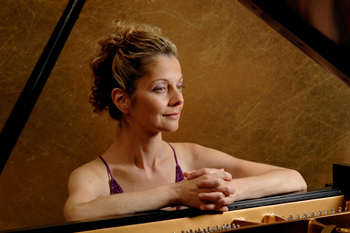by Daniel Hathaway

Born in Beirut, Lebanon, Nada Loufti fled into the mountains to escape civil war and terrorism, which claimed her mother’s life in a mortar explosion. Her seven years in exile nevertheless prepared her to enter the Paris Conservatory, where she was the first woman of Middle Eastern descent to win a first prize.
“I loved it. The Conservatory was still in its old building on the Rue de Madrid — such a historic place,” the pianist said in a telephone conversation.“It was very conservative, but it had its good side. I performed a lot of French repertoire and got to know Henri Dutilleux — his wife was my teacher. And the teacher next door was Yvonne Loriod, Messiaen’s wife. Because the Conservatoire had a box at the Paris Opera, I went to almost every performance,” she said, mentioning that one memorable experience was hearing Messiaen’s St. François d’Assise conducted by Seiji Ozawa.
Having made the journey from Beirut to Paris, Nada next moved to New York and then — via a marriage — to Kentucky. “In the middle, I lived in New York City for five or six years,” she said. “I came back here because I’m a poor artist and I know a lot of people in Louisville. I don’t have any family in the U.S. so I’m kind of a Bohemian. I have a unique career that includes a lot of outreach and moving around.”
Some of that moving around has involved a carting a piano about on the back of a truck, the means Nada used to bring classical music to country people in Kentucky. “If I had moved from Paris to New York, I would never have known what the real United States is all about. I’ve discovered so many things about the people.”
Some of Nada’s listeners had never seen a piano or heard classical music before. She started salon-style concerts in her own home, playing and talking about the music. “People knew about Mozart, but not about other things,” she said. “I became sort of an educator, introducing the music to everyone. It was so refreshing to see how much they loved it. It was some of the most incredible experiences I’ve had.”
Nada’s next outreach mechanism was radio. “That was completely unintentional. After returning from New York, I got connected with the big public radio station here, and became a classical DJ. Then everything changed. The director left, and they reduced the budget, but I got lucky and found another station. I’m the only classical radio program there, and I get a lot of listeners, even compared to bluegrass programs. It’s not a built-in classical audience you can play Kodály or Bartók to for two hours — more like ten minutes. But it’s an effort to get classical music out to everyone, both on the radio, on the Internet, on Facebook, and on SoundCloud.”
Nada met Robert Cronquist last year when he booked her through an artist representative for a concert with the Lakeside Orchestra. That led to her appearance next Sunday with the Women’s Orchestra. Who chose the concerto for the occasion? “My big inclination was to play Brahms,” Nada said, “but Robert asked me what do you have other than Brahms? So I said Beethoven 5. It’s a very joyful piece, a big dance of joy with fireworks at the end and a little bit of reflection in the middle.”
Also on Sunday’s program: Camille Saint-Saëns’ March Militaire Française, and Pyotr Tchaikovsky’s Symphony No. 2. Tickets are available through the Severance Hall box office.
Published on ClevelandClassical.com April 4, 2017.
Click here for a printable copy of this article



